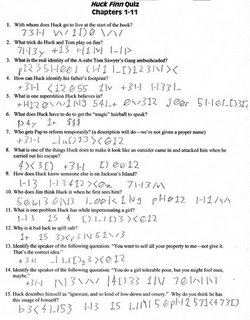 You will find geeks in every grade you teach. Many of us can remember who the geeks were in our classes growing up (some of this may hit too close to home for some of you, as you represented these awkward individuals). One such student, a gregarious geek in my American Lit class, was not ashamed to show his roots. He would wear shirts with slogans such as: "There's no place like 127.0.0.1" and many would look confusedly while the elite, the few knew what the numbers represented--your home network.
You will find geeks in every grade you teach. Many of us can remember who the geeks were in our classes growing up (some of this may hit too close to home for some of you, as you represented these awkward individuals). One such student, a gregarious geek in my American Lit class, was not ashamed to show his roots. He would wear shirts with slogans such as: "There's no place like 127.0.0.1" and many would look confusedly while the elite, the few knew what the numbers represented--your home network.I heard the term Leet thrown around last year, and couldn't completely understand it until this student forced me into a corner. With Eric's tutelage, I was able to make sense of it. Essentially, in my overly simplistic definition, Leet is a language for nerds alone. They take letters and morph them into similar looking numbers and symbols, so the transliteration can be indecipherable to some. This can be called Leetspeak, or 13375p34k. Make sense? There can be many variants of how to do this, but if you look closely enough at the shapes, you can pick up on it if your mind can think abstractly. For the curious who want to know more about how it came to be called Leet or some common transliterations, Wikipedia tries to define it for the ignorant masses. And Google created a search page in 1337 to cater to fans who just can't get enough.
So how does this relate to teaching? Well, once in a while, this student would write a phrase in Leet, and when I had no idea what it was, it read as a meaningless jumble. One day, after I'd been educated, I was handing out a quiz on The Adventures of Huckleberry Finn. Students are rarely ecstatic for quizzes, so this student groaned and threatened to write his answers in Leet. I wasn't intimidated, and he began. What was meant to be a relatively easy quiz, just meant to assess that students were keeping up in their reading, kept him busy in his attempts to make it challenging for me to read. I had to make a copy of it before I graded it so I could remember this antic. For instance, in response to my question,
"What is one superstition Huck believes in?", this student writes:
"+l-l120\/\/1l\lg 54l_+ 0\/312 j00r 5l-l0l_312," which translates to:
"Throwing salt over your shoulder." Easy, right?
1 comment:
Grr. For those of you who know html better than I, perhaps you know the reason half of my original leet example kept disappearing, right after "looking." If so, explain this to me. I'll include the original example here in the comments, and hope the new one isn't confusing the code with its 'm4d hax0r' skills.
For the question: "Who does Jim think Huck is when he first sees him?",
this student writes: "50lvl30\l3 l_00l<1l\lg pl-l012 l-l1/\/\",
which translates to "Someone looking for him."
Post a Comment